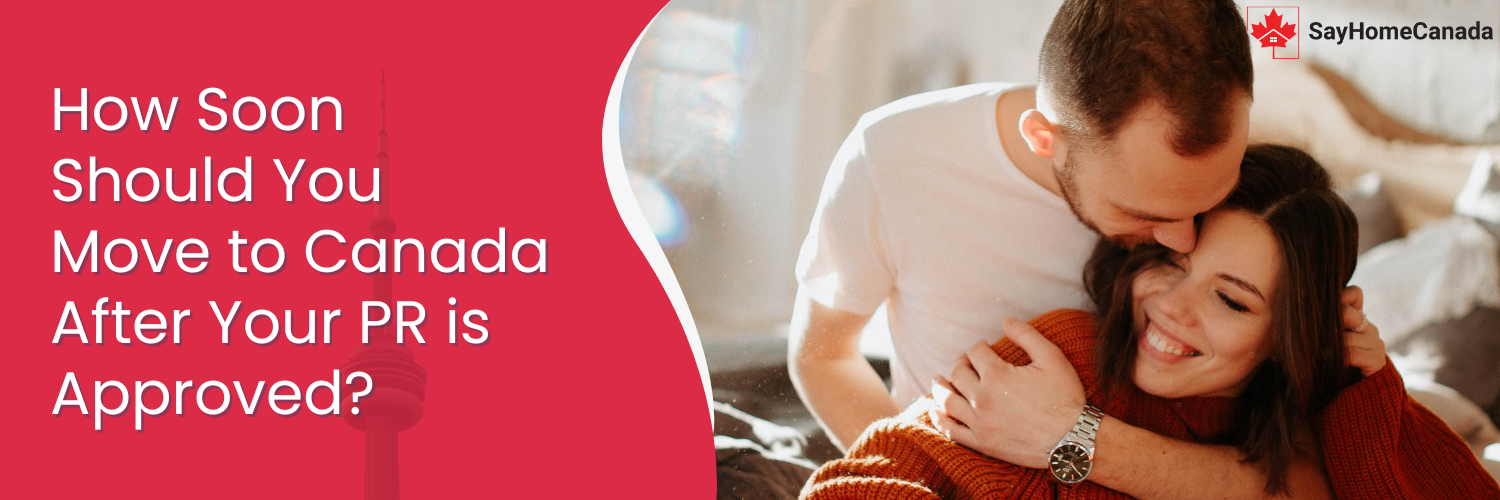
 PR
PR
Congratulations! You’ve just received the news that your application for permanent residency in Canada has been approved. This is an exciting and life-changing milestone that brings you one step closer to starting a new chapter in the Great White North.
However, before you embark on your journey to Canada, there are several crucial factors to consider to ensure a smooth and successful transition. Moving to a new country requires careful planning and preparation, and understanding when and how to make the move to Canada is essential.
In this comprehensive blog post, we will guide you through the process of determining the best time to move to Canada after your Permanent Residency is approved. For expert advice and personalized immigration solutions, trust SayHomeCanada Immigration – your partners in realizing your Canadian dream.

The approval of your permanent residency in Canada is a significant achievement after undergoing a thorough application process. It involves submitting various documents, completing medical examinations, and waiting for the authorities to process your application.
Once your application is approved by Immigration, Refugees, and Citizenship Canada (IRCC), you will receive a Confirmation of Permanent Residence (COPR) document. This document is vital as it serves as official proof of your permanent resident status in Canada.
Before making your move to Canada, it’s essential to be aware of the validity period of your COPR. In most cases, the COPR is valid for one year from the date of your medical examination or police clearance, whichever comes earlier.
However, the validity period may vary based on individual circumstances or any specific conditions imposed on your permanent residency. It is crucial to check the expiration date on your COPR to ensure compliance with the timelines.
Moving to a new country requires meticulous planning and preparation. Once your Permanent Residency is approved, you need to start making arrangements for your move to Canada. This includes several crucial aspects such as:
a. Accommodation: Secure a place to live in Canada. This may involve renting a temporary place initially or arranging for long-term housing, depending on your plans.
b. Employment Opportunities: Explore potential job opportunities in Canada that align with your qualifications and experience.
c. Healthcare Coverage: Familiarize yourself with Canada’s healthcare system and determine your eligibility for health coverage.
d. Education and Schools: If you have children, research and enroll them in suitable schools or educational programs in Canada.
e. Finances and Banking: Open a bank account and make arrangements for financial transfers and transactions.
f. Legal and Documentation: Gather all essential documents, including passports, Permanent Residency documents, educational certificates, and other relevant paperwork.
The timeline for moving to Canada after your Permanent Residency is approved is relatively flexible within the COPR’s validity period. Some individuals may decide to move immediately, while others may need more time to address personal or professional commitments in their home country before relocating.
It’s essential to find a timeline that suits your personal circumstances and aligns with your relocation preparations. Remember that the COPR’s validity period allows you sufficient time to plan your move thoughtfully.
After you move to Canada and activate your permanent residency, it is crucial to meet the residency obligations set by the Canadian government. As a permanent resident, you are required to reside in Canada for at least 730 days within every five-year period to maintain your status.
Failing to meet these residency obligations could result in losing your permanent residency. Therefore, plan your time in Canada wisely to fulfill these requirements.
Deciding when to move to Canada and navigating the immigration process can be overwhelming, especially with the various considerations and requirements involved. Seeking professional guidance from an experienced immigration consultancy like SayHomeCanada Immigration can provide invaluable support and ensure a seamless transition to your new life in Canada.
Their team of experts can assist you with visa applications, relocation services, and personalized advice tailored to your specific needs.
With their guidance, you can navigate the immigration process confidently and make informed decisions about your move to Canada. Moving to Canada after your Permanent Residency is approved is an exciting and life-changing decision.
However, it requires careful planning and consideration of various factors. The timeline for moving to Canada is flexible within the validity period of your Confirmation of Permanent Residence (COPR).
Take the time to prepare for your move, addressing accommodation, employment, healthcare coverage, education, finances, and legal documentation. Lastly, remember to meet the residency obligations to maintain your permanent residency status.
Ready to start your new life in Canada? Let SayHomeCanada Immigration be your guiding light! 
Whether you need assistance with visa applications, relocation services, or understanding residency obligations, we are here to support you every step of the way. Contact SayHomeCanada Immigration today and turn your Canadian dream into a reality.
The timeline for moving to Canada after your Permanent Residency is approved is flexible within the validity period of your Confirmation of Permanent Residence (COPR). Generally, the COPR is valid for one year from the date of your medical examination or police clearance, whichever comes earlier. However, it’s essential to find a timeline that suits your personal circumstances and aligns with your relocation preparations.
You may travel to Canada as a visitor while your Permanent Residency application is still pending. However, if you plan to stay in Canada as a permanent resident, you must wait until your Permanent Residency is approved, and you receive your COPR. Keep in mind that traveling as a visitor doesn’t guarantee approval of your Permanent Residency application.
To maintain your permanent resident status in Canada, you are required to reside in the country for at least 730 days within every five-year period. These days need not be consecutive and can be accumulated over time. Meeting the residency obligations is essential to retain your PR status and avoid potential loss of permanent residency.
Thank you for the response .
Let's Connect